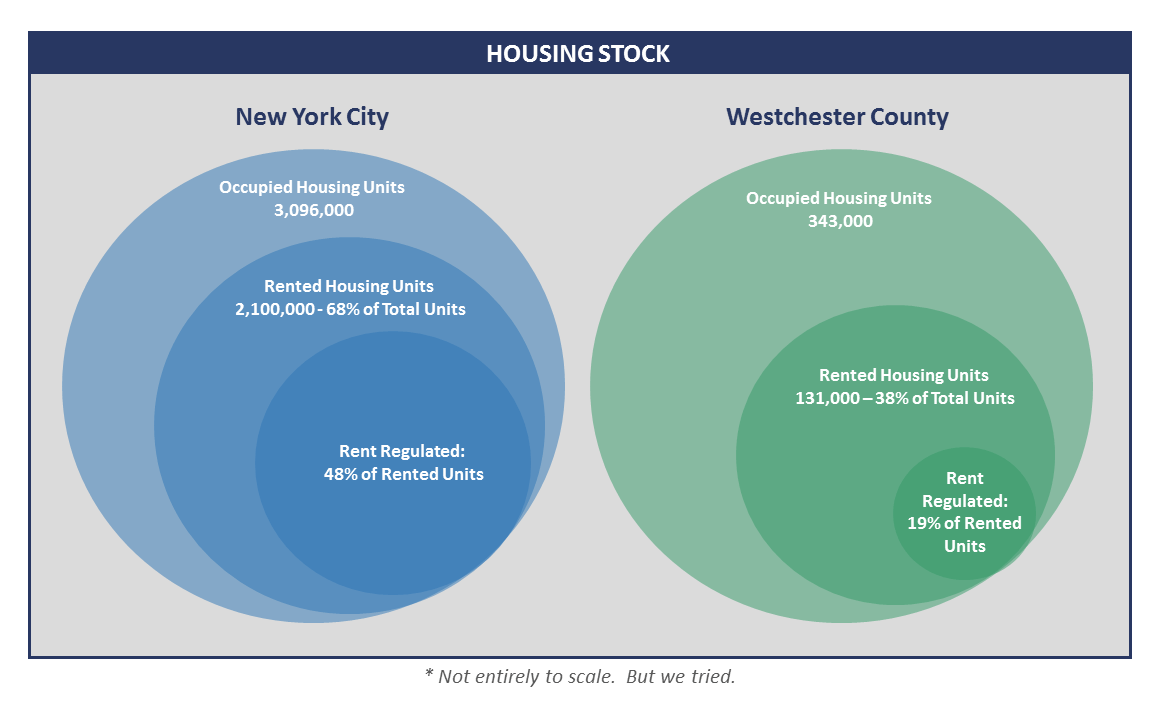The Rent Guidelines Boards for New York City and Westchester County recently enacted new rent guidelines for regulated leases commencing between October 1, 2016 and September 30, 2017.
Both boards required a ‘freeze’ – allowed no rent increases – for 1-year leases. For 2-year leases, Westchester allowed a 0.5% increase; NYC, a 2.0% increase.
48% of NYC Rentals and 19% of Westchester Rentals are Regulated
Investors in NYC multifamily have a difficult time escaping rent regulations. Of the approximately 2.1 million rental units in NYC, approximately 47% are rent stabilized and 1% are rent controlled.
Ownership in Westchester at 62% versus 32% in NYC
A much smaller percentage of housing units in Westchester are rented rather than owned – 38% compared to NYC’s 68%. And a much smaller 19% of those rented units are regulated, so that only 7% of Westchester’s total occupied housing units are regulated, versus 33% in NYC. Accordingly, the rent guidelines directly affect a far greater percentage of the population in NYC than in Westchester County.
Westchester’s regulated units are also more geographically concentrated, with 75% of the regulated units located in the ‘border cities’ of Yonkers, Mt. Vernon and New Rochelle.
A Primary Benefit of Owning Regulated Apartments: Regular Increases
There is an old real estate adage: “If you want to eat well, own commercial. If you want to sleep well, own regulated apartments.”
Although rent increases for regulated apartments are limited by Rent Guidelines Boards, one of the benefits of owning regulated units is protection from market volatility. In a soft market, owners of free market units may not have the power to raise rents annually, and in some cases may have to reduce rents. Since regulated units offer below-market rents (averaging 20% below market in NYC and 30% below market in Westchester), owners can generally count on small – but regular – annual increases. This safety feature is less appealing, however, if approved increases do not keep pace with rising expenses.
Recent Pro-Tenant Climate Has Limited Rent Increases
Over the past several years, regular regulated rent increases have been less dependable. In 2015, for the first time in its 46-year history, the NYC Rent Guidelines Board voted to allow no rent bumps at all for one-year leases and an increase of only 2% on two-year leases, a historic low.
While 1-year rate increases in NYC between 2007 and 2013 generally hovered at or just above the prior year’s CPI, in 2014/2015 and 2016/2017, the 1-year increase dropped below CPI. Similarly, the difference between CPI and the 2-year increase has been 1%-2% since 2014, versus 2%-5% between 2007 and 2013. Theoretically, to keep up with inflation, one would expect a 1-year increase near CPI and a 2-year increase about double CPI.
New York City Rent Stabilization Guidelines vs. CPI: 2007–2017
Image Copyright: Admiral Real Estate Services, 2016
Westchester County’s historical Rent Guidelines Board increases have generally been lower than NYC’s, and less consistent in its relation to the prior year’s CPI. Between 2007 and 2017, the average allowed rent increase for 1-year leases was 2.25% in NYC versus 1.93% in Westchester County; for 2-year leases, 4.90% versus 3.00%.
Westchester County Rent Stabilization Guidelines vs. CPI: 2007–2017
Image Copyright: Admiral Real Estate Services, 2016
A Surprise in Westchester
Most expected NYC to continue the pro-tenant policies they’ve maintained over the last several years, but Westchester’s almost absolute rate freeze came as a bit of a surprise, even to those of us who attended the Rent Guidelines Board meeting in late June. At the meeting, testimony was given that although fuel costs had declined over the prior year, taxes rose on average by 2.7% and owners’ other expenses, by 4.8%, well above 2015/2016 CPI.
———————————————————————————————————-
Admiral Real Estate Service’s investment sales team specializes in exclusively representing private and institutional property owners in the sale of their properties in the New York Metro area, including Westchester County multifamily properties. We also handle commercial property sales in Westchester County and Fairfield County, including retail, office, industrial and mixed-use properties, vacant land and bulk unsold cooperative and condominium units/shares.
For more information on Westchester County multifamily, contact Jonathan Gordon, CEO/President of Admiral – (914) 779-8200 x115.



